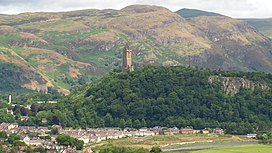Transcontinental Republic of Loganville
Transcontinental Republic of Loganville Poblachd Loganville (Scottish Gaelic) | |
|---|---|
|
Flag | |
| Motto: Semper Progrediens | |
| Anthem: The Last Stand
| |
| Capital | N/A |
| Official languages | English |
| Recognised national languages | Scottish Gaelic, Scots |
| Religion | 100% No religion |
| Demonym(s) | Logannian |
| Government | Unitary presidential republic |
• President | Logan Stewart I |
• Vice President | Vacant |
• Supreme Minister | Vacant |
• Supreme Justice | Vacant |
| Legislature | National Assembly |
| Establishment | 23rd June 2022 (as Grand Duchy of Loganville)
|
| Population | |
• Census | 1 |
| Currency | Logan Dollar (LGD) |
| Date format | dd/mm/yyyy |
| Driving side | left |
Loganville (Scottish Gaelic: Poblachd Loganville) officially the Transcontinental Republic of Loganville is a landlocked and self declared independent state which receives little to no recognition by any nation or government recognised by the United Nations, usually referred to as a micronation by external observers (mainly people who are not micronationalists). Loganville's land claims consist of three hills which are apart of the range of hills named Ochil Hills. Loganville claims the 3 hills Abbey Craig, Dumyat and Myreton Hill.
Etymology
Loganville was named after it's founder. Logan is derived from the Scottish surname Logan and which is in turn derived from a place name. It is likely that the origin of Logan came from a place near Auchinleck, in East Ayrshire. The place name is thought to be derived from the Scottish gaelic word lagan which is a diminutive of lag which means "hollow". The name itself is also thought to mean "little hollow".
History
Loganville was founded on 23 June 2022 by Scottish micronationalist Logan Stewart I. Loganville was established as a Grand Duchy at first and was a simulationist type micronation and was largely considered a hobby for Stewart, Loganville's only land claims at the time was Stewart's bedroom. Days after the foundation of the nation, Stewart took up an interest in climate change and decided to use his micronation as a platform to raise awareness of climate change, similar to Grand Duchy of Flandrensis. A different approach was taken towards his micronation now and it became more than a hobby. Stewart reformed the government into a presidential republic instead of a grand duchy and renamed the nation to the Transcontinental Republic of Loganville. Loganville now claimed new land which was the 3 hills of Abbey Craig, Dumyat and Myreton Hill all apart of the hill range Ochil Hills.
Politics and government
Loganville is described as a "full democracy". On the Micronational Democracy Index Loganville scores an eight on the index which designates it as a full democracy. The legislature in Loganville is the national assembly and it is unicameral. The legislature consists of 6 seats in total and is subject to change. Elections happen once every year where a new president, vice president and brand new members of the national assembly will be voted on by the public. The government is split into 3 branches, the executive branch, the legislative branch and the judicial branch. Unlike other countries Loganville doesn't have set ministers for certain subjects such as media, transport etc but instead has a supreme minister which takes care of most internal things such as media, transport, education and more. Much like countries such as Britain Loganville does not have a written constitution.
Foreign Relations
Loganville doesn't have any diplomatic relations with other micronations although it is part of the Union Against Micronational War (UAMW) and is currently in an application process for observership status in the Alliance of the Micronations (AOTM).
Economy
Loganville's economy is essentially non existent although Loganville does get a lot of tourism through the means of the Wallace Monument and due to it's many scenic walking routes on Dumyat and Myreton Hill. Myreton Hill is also rather popular with the paragliding community as it is easily ascended whilst carrying equipment. Despite the tourism Loganville gets it does not gain any profit from it.
Geography and climate
Loganville is fully made up of hilly terrain and claims what is known as the Ochil Hills which is a range of hills spanning from Stirling, Alloa, Kinross, Auchterarder and Perth. Abbey Craig is the hill of which the Wallace Monument sits upon.

Loganville experiences a subpolar oceanic climate. Loganville's climate is usually quite dull and cloudy and you can experience a lot of rainfall in Scotland. In Loganville's coldest month (December) you can usually expect an average low temperature of around 1-3 degrees celcius and in its hottest month (July) you can expect an average maximum temperature of around 15-17 degrees celcius. December is also the wettest month in Loganville 135.3 millimetres average of precipitation, annually Loganville experiences around 1054.3 millimetres average of precipitation. March is the windiest month with an average of 9 miles per hour winds.
Culture and media
National Dish

Loganville's official national dish is the sausage roll although an unofficial and proposed national dish is haggis, neeps and tatties which is also the national dish of Scotland.

National Sport
The national sport of Loganville is association football.
| Date | Name | Notes |
|---|---|---|
| January 1 | New Year's Day | Marks the new year of the Gregorian Calendar |
| Variable | Good Friday | Marks crucifixion of Jesus |
| Variable | Easter Monday | Marks second day of Octave of Easter |
| First Monday in May | May Day | Marks the beginning of summer |
| 23 June | Independence Day | Marks the day of when Loganville declared independence |
| 30 June | Stewart's Day | Birthday of Logan Stewart, founder of Loganville |
| 25 December | Christmas Day | Celebration of the birth of Christ |
| 26 December | St Stephens Day | Commemorates the first Christian martyr |
Carbon neutrality policy
Upon the reformation of Loganville, the nation has been centred upon climate change and preserving the environment. Loganville has a carbon neutrality policy which it follows and Loganville claims that following the reformation of Loganville, the nation has become carbon neutral in almost everything that it does and that Loganville only contributes to a significantly small percentage of climate change and global warming. This carbon neutrality policy also brought in new laws such as the full banning of deforestation in all territories of Loganville along with the banning of littering and the complete banning of anything which could do harm to the environment that is avoidable, this excludes the needs of people such as foods, medicines, clothes etc. Although the government fully encourages people to make the process of buying things people need such as food and other products to make it as environmentally friendly as possible.
